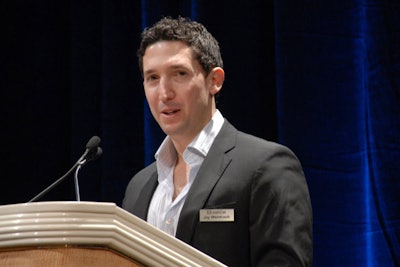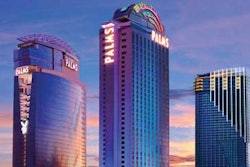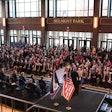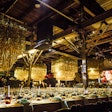
When Jay Weintraub quit his job as an Internet advertising professional to create the LeadsCon conference series without any prior planning experience, he says he felt a bit like a racehorse: “You are on a track and you have blinders on, and you just go.” Continuing that metaphor, you could say Weintraub won the race: His first event in April 2008 attracted 600 people at the Palms in Las Vegas, and it has grown steadily since then. Weintraub added a New York edition in 2009, and in 2012 he sold the business to Access Intelligence. Earlier this year he launched Grow.co, a customer acquisition strategy firm that conducts research and hosts events. At the Society of Independent Show Organizers’ Executive Leadership Conference last week at Revel hotel and casino in Atlantic City, New Jersey, Weintraub shared what he has learned about attracting attendees and his thoughts for the future. We spoke to him shortly after his presentation.
How did you get the idea to create LeadsCon?
I was a domain expert in the area of Internet advertising. Every time I went to the two major shows that existed, I saw the people in my community and I saw the exhibitors that overlapped with my community, but none of the sessions did. I couldn’t understand that. There was nowhere for us to talk about the issues that we cared about. It felt like we [Internet advertising professionals] were doing ourselves a disservice as an industry by not having our own thought leadership platform.
To create a conference from scratch, without prior event planning experience, sounds very entrepreneurial. And yet you don’t consider yourself an entrepreneur?
The term I borrowed from someone else is “eventpreneur.” The reason I don’t necessarily call myself an entrepreneur is these people are truly taking risks, truly changing the world, truly disruptive. For me, I’ve always described it as something out of necessity. I just don’t do well in large corporations. I don’t mean to be a bad employee, but I always end up getting in trouble, so the only answer is to be in a position when you are the one responsible. That’s the only way for me to survive.
By the second year, attendance grew from 600 people to nearly 1,500, and you added the New York event. What did you learn?
I got into starting an event by being a domain expert, by being a blogger. I had built up an audience and a credibility. Initially, the reason people came was because I personally knew what I was talking about. The hardest transition is going from start-up to scale when you are doing a subject-matter show. After the first year, one of the questions I got all the time was, "Why should I attend, because it’s not like you are still doing this day-to-day anymore, so what am I going to learn?" So it was understanding the value of the event was no longer just about me and what I knew but about what could get done when people get together. Understanding it as a place where people built relationships and got work done.
Why do you think the event was so successful from the beginning?
Our job is to make sure people don’t know we’re there. If something is noticed, it means we screwed it up. No one’s there for registration, they come for their own agenda, and anything that disrupts their own agenda is a bad thing. It was frictionless from most people’s standpoint, and I think that was key. The other thing for us was customer service. We really cared. We weren’t just selling you a ticket or a selling you a booth. We really, really wanted you to be there and really valued your opinion of it. We really cared about your return on investment. If we didn’t think you were a good fit, we would tell you not to sponsor. If we thought you wouldn’t get anything of value, we tried to discourage you from registering. We didn’t want to jeopardize the long-term relationship just for the short-term benefit. That’s the lucky thing about being an independent. It would be different if I’m working for somebody and I’ve got goals to hit. That’s how I’d be judged. It’s so much harder to be judged on a long-term basis when you have short-term incentives. So we could get away with not hitting this number, because we truly believed that it was in the best interest and would be better in the end.
In February, you launched the Grow.co events targeted to customer acquisition marketers. How has this been different than your experience with LeadsCon?
There was this wild-card factor that we didn’t anticipate, which was that the reason the other show worked so well was that the user behavior was already defined—they were already going to shows. For this new community, many of them are really young in their careers, and the idea of going to shows is completely foreign to them. It’s not ingrained in their behavior. They don’t spend much time out of work, and if they do they are glued to their machines all the time. So we ran into this behavior challenge of how do we get them over the hump and how do we help them realize that getting together is a good thing. It’s a continuing challenge. We’re trying to understand our audience and how they identify, how they like to gather, what resonates with them, who wants to be with whom in a room. It’s been very painful and very expensive. There is no secret sauce or magic. It really is just like putting together a jigsaw puzzle—keep turning over pieces and you hope to find some that connect together.
What have you learned about the preferences of these younger professionals?
It’s the difference between a festival mindset and an expo mindset. The reason South by Southwest is so popular and TechCrunch Disrupt is so popular, and clearly the reason something like Burning Man is so popular, is that they are festivals and people want to be around a lot of action. So being in a more traditional venue doesn’t do it. Most of what we are selling is so digital. When you are selling a digital thing, walking booth to booth is not always the best way to get a sense of what it does, because you can’t feel it, touch it. When you are not doing a physical good you don’t necessarily need that traditional way of showcasing your wares. So for a lot of these digitally driven activities, they don’t want that typical experience. They want the equivalent of a festival.
What are your thoughts about the future of events?
The real disruptor in this event ecosystem is the client summit. It’s Salesforce, it’s Oracle, Google, Facebook. It will be Twitter soon enough. These companies say, "We’ll just do our own show." In many cases they will be able to sell tickets by year two, they can control everything. There are several of these client summits where there is no industry show. Salesforce is the classic example. There is no CRM [customer relationship management] show, it’s Dreamforce. Some of the more traditional expo companies may want to discount the power of the client summit, but as we move into industries where it’s just digital and not as goods- or showcase-driven, these are the powerhouses. And the fact that a client summit in two years’ time can start to rival, if not beat, some of these incumbents is a huge deal. And it’s something that we as independents need to worry about and understand.



















